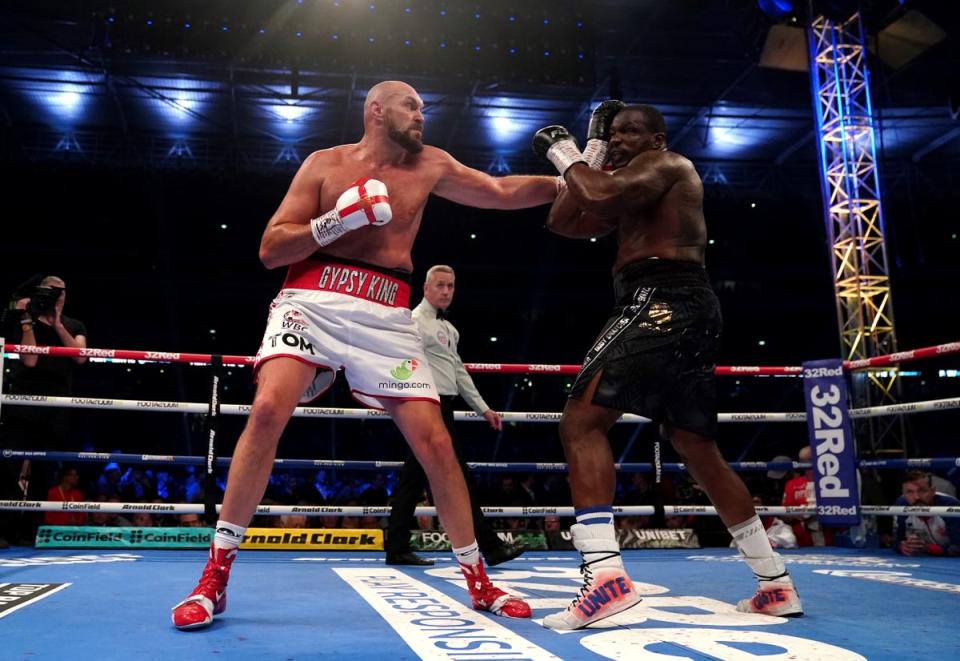Built to survive, Dillian Whyte is fighting back and still here

Dillian Whyte was built to survive. He survived a life of neglect, of violence, of rejection, of shooting, of stabbing, of prison, of wins and savage losses in the ring. He survived and he is still here telling the tale.
On Saturday, indoors at Wembley, he continues the heavyweight journey he started a decade or so ago when he fights unbeaten American, Jermaine Franklin. It’s another fight for the right to remain a genuine contender; it is one of boxing’s most respected titles, but nobody ever wants to be the loser.
Whyte lost his last fight when, under a banner of stars and lights outdoors on the pitch, he was knocked out by Tyson Fury in round six of their heavyweight world title fight at Wembley Stadium. It was not the ending that Whyte had dreamed of during the 1,000 days and nights he waited for his opportunity. Tyson was clinical on the night, Whyte looked lethargic. The chilling ending was not easy to predict.
“It was bad,” insisted Whyte. “I was bad. But I’m back now and I want him again. I’m a fighter and fighters always believe they can win. They have to believe they can win. I need to avenge all my defeats.” Whyte is the eternal boxing optimist.
The fight with Franklin, which will be one of about twenty televised fights this weekend in Britain, is a must-win scrap for Whyte. And, for Franklin it is a golden chance to bypass the usual routes, the established roadblocks and get closer to the leading contenders. It is, for sure, a shortcut fight for the American.
Franklin flew to Britain over a month ago and has been based in Morecambe, sparring and living with Fury. He has also been to East London sparring with Daniel Dubois. Franklin has clearly not taken the fight lightly. Franklin had a couple of years out of the ring for personal issues and has compiled a record of 21 fights without loss; he has not been tested, he has not beat a list of dangerous men, but staying motivated and undefeated in the business is still difficult. Franklin is a danger because of that and not because of the men he has beaten. Whyte is not a fool – he knows Franklin is a very real unknown threat.
“Undefeated guys are hard to fight,” added Whyte. “They don’t know how to lose.”
Whyte is now 35, he has lost three times in 31 fights and during the last six years he has never swerved a challenge on either side of the ropes. He fights with an open heart and, unfortunately, an open guard at times. Anthony Joshua, Alexander Povetkin and Fury all found the gaps to slot home knockout punches. Whyte did get revenge over Povetkin, now he wants to get back with Fury and Joshua. In the strange land of heavyweight chaos, nothing can ever be ruled out. Whyte should know enough to beat Franklin and keep his name on the lips of the men running the sport. Whyte has been a nuisance to the champions and the fixers in the sport for a long time – he is not in a rush to go away.

On the same night, on the other side of London, Zach Parker and John Ryder fight for the interim WBO super-middleweight title at the O2. It is simply one of the best British fights of the year. Ryder has the experience, Parker has the ability; Ryder has lost five times in his career, but his best win was earlier this year when he beat the American, Danny Jacobs. Ryder does not have his pipe and slippers ready just yet. In the other corner, Parker is unbeaten and has never mixed in the same type of company as Ryder. It is genuinely fascinating. Ryder is not the old-timer that the fight’s simplistic narrative wants to take. Parker will need to be better than we have seen so far to beat Ryder.
Whyte, Franklin, Parker and Ryder are all part of a unique weekend for British boxing. On Friday, Saturday and Sunday, boxing shows will be broadcast on Channel Five, DAZN, BT and Sky. There will be six genuine title fights, the Whyte scrap and the continuing ring education of Adam Azim, on the four televised shows. it is just one weekend and there were never months likes this in the Seventies or Eighties; the British boxing business never ceases to amaze.

 Yahoo News
Yahoo News 
